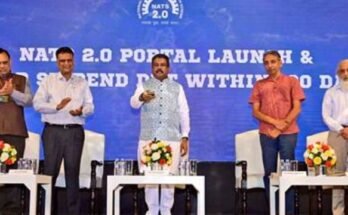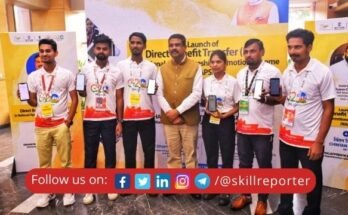Jamshedpur : Under a multiparty collaborative initiative of National Skill Development Corporation, leading industry chamber Confederation of Indian Industries (CII) and German institution Deutsche Gesellschaftfür Internationale Zusammenarbeit (GIZ), 9th edition of the Skill Connect Road Show workshop sequel held in Jamshedpur on September 12.
The workshop witnessed the presence of Mr Ravi Ranjan, IFS, Mission Director, JSDMS, Department of Higher, Technical Education and Skill Development and Mr Amar Jha, CEO, JSDMS, Department of Higher, Technical Education.
Mr Surajit Roy, Director, Apprenticeship, NSDC,explained the reforms under the Apprenticeship Act that have incorporated most of the demands of the industry to make the apprenticeship regime industry-friendly and shared the new operational framework for Apprenticeship in India. He informed the participants about the overwhelming participation in the previous workshops and promised them to take the outcome of the Jamshedpur workshop to a conclusive result. He urged the multiple small industries to come together and choose a training of their liking for Apprenticeship. He emphasized that the new reforms will enhance self-regulation amongst the industries as the Apprenticeship Training under NAPS is a private sector-driven programme.
By delegating the decision-making powers to the Sector Skill Councils and making them the Apprenticeship advisors,the new Act has been designed to identify the needs of the industry owing to their excellent connect with the industry and turn the apprentices into long-term assets, Mr Roy said.
Mr Ravi Ranjan explained the Apprenticeship Programme in the context of Jharkhand. Hailing the excellent presence of industries in Jamshedpur, he appealed the participants to embrace the Apprenticeship Training, train the workforce according to their requirements, and avail financial and other benefits from the government under NAPS. Stressing over the lack of interest amongst MSMEs in Jharkhand to participate in training of their workforce, he envisioned a huge scope for training and skill development in the State.
Mr Amar Jha appreciated the efforts of NSDC, CII and GIZ in reducing the skill gap in the Indian skill ecosystem. He highlighted the urgency of the need to formally train the workforce in India by comparing the magnitude of formally skilled workforce in places like Germany, South Korea, UK and Japan. He also raised the issue of unemployability of engineers and managers after they complete their vocational education in the institutions. Mr Jha explained the importance the shop floor training in enhancing the efficiency of candidates and the quality of their output with regards to quality of the product and service. He appealed the participants to oblige employees by providing them the necessary exposure and hands-on experience on machinery and other advanced technology, which will help them manufacture products and render services of international standards. This will enable India to become an exporting country, which will not just export products and services but also the youth, he said.
GIZ presented the Indo-German Programme for Vocational Education and Training and the experiences made by the project in creating a systemic change by enabling industry associations to become ‘professional skill development service provider’ for its member companies. Elements of the German models of Dual VET which can be replicated in India, especially the larger focus on in-company training, training of the in-company trainers and the role of the chambers in implementing the vocational training was presented.
The IGVET experiences from Bhiwadi and Aurangabad were shared in detail to create an understanding on how the industry or cluster associations can apply elements from the new Apprenticeship operational framework to steer the skill development services. The need for training of in-company trainers and counselling sessions to ITI trainees as well as youth interested in skill training, was stressed by GIZ. The importance of assessment, certification and promotion of VET by the chambers in German schools was highlighted and used as a tool of motivation for the participating chambers in Jamshedpur.
CII presented its 360-degree assistance in the Indian industrial ecosystem and offered to support the industries through hand holding, providing a help desk and addressing both the demand and the supply side with respect to the Apprentices by systematic identification through Model Career Centre, which have been established to overcome the limitations of the Employment Exchange. By means of interactive session, the participants were invited to deliberate on the inputs provided by NSDC, CII and GIZ. The results of the group discussions were shared in plenary, which included the job roles which are required by the companies including the number of apprentices against each of these job roles; the support which is required for enabling the companies for effective participation in apprenticeship programme and the challenges they are currently facing.
Suggestions from participants to undertake more number of practical training programmes and soft skills courses in the curriculum were welcomed by the authorities. Several clusters where Apprenticeship Programmes can be offered were identified and discussed. Issues raised by the industry with respect to the Apprenticeship Programme were addressed, and their concerns noted. The workshop ended on a positive note with expectations of enhanced engagement by all the stakeholders in promoting Apprenticeship Programme. Several companies identified job roles and stepped forward/raised their hands towards engaging apprentices in their organizations. The next workshop under the Skill Connect Road Show will take place on September 17th in Visakhapatnam.



